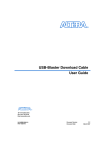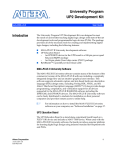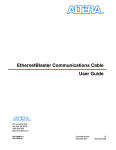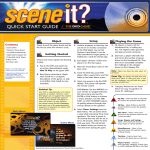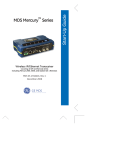Download ByteBlasterMV Cable User Guide
Transcript
ByteBlasterMV Download Cable User Guide 101 Innovation Drive San Jose, CA 95134 (408) 544-7000 http://www.altera.com P25-10323-00 Document Version: Document Date: 1.0 July 2004 Copyright © 2004 Altera Corporation. All rights reserved. Altera, The Programmable Solutions Company, the stylized Altera logo, specific device designations, and all other words and logos that are identified as trademarks and/or service marks are, unless noted otherwise, the trademarks and service marks of Altera Corporation in the U.S. and other countries. All other product or service names are the property of their respective holders. Altera products are protected under numerous U.S. and foreign patents and pending applications, maskwork rights, and copyrights. Altera warrants performance of its semiconductor products to current specifications in accordance with Altera's standard warranty, but reserves the right to make changes to any products and services at any time without notice. Altera assumes no responsibility or liability arising out of the application or use of any information, product, or service described herein except as expressly agreed to in writing by Altera Corporation. Altera customers are advised to obtain the latest version of device specifications before relying on any published information and before placing orders for products or services. Printed on recycled paper ii Altera Corporation Contents About this User Guide ............................................................................. v Revision History ........................................................................................................................................... v How to Find Information .............................................................................................................................. v How to Contact Altera .................................................................................................................................. v Typographic Conventions ........................................................................................................................... vi Abbreviations & Acronyms ........................................................................................................................ vii Chapter 1. Installing the ByteBlasterMV Download Cable Introduction .............................................................................................................................................. 1–1 Installation ................................................................................................................................................ 1–1 Installation on a Windows PC ............................................................................................................. 1–1 Installing the Altera ByteBlaster Driver with the BBLPT Utility ................................................. 1–2 Installing the Altera ByteBlaster Driver on Windows NT ............................................................ 1–2 Installing the Altera ByteBlaster Driver on Windows 2000 .......................................................... 1–3 Installing the Altera ByteBlaster Driver on Windows XP ............................................................. 1–4 Installing the ByteBlasterMV Download Cable ............................................................................ 1–6 Installation on a Linux Workstation .................................................................................................... 1–7 Installing the Altera ByteBlaster Kernel Driver for Linux ............................................................ 1–7 Installing the ByteBlasterMV Download Cable on a Linux Workstation ..................................... 1–8 Selecting a Communications Cable for the SignalTap II Logic Analyzer .......................................... 1–9 Chapter 2. ByteBlasterMV Download Cable Data Sheet Features ..................................................................................................................................................... Functional Description ............................................................................................................................. Download Modes ................................................................................................................................ ByteBlasterMV Connections .............................................................................................................. ByteBlasterMV Header & Plug Connections ................................................................................ Circuit Board Header Connection .................................................................................................. Operating Conditions ................................................................................................................................ Software Instructions ................................................................................................................................ Conclusion ................................................................................................................................................ References ................................................................................................................................................ Altera Corporation 2–1 2–1 2–1 2–2 2–3 2–4 2–5 2–6 2–7 2–7 iii Contents iv ByteBlasterMV Download Cable User Guide Altera Corporation About this User Guide Revision History The table below shows this user guide’s revision history. ByteBlasterMV Download Cable User Guide Revision History Date July 2004 How to Find Information You can find more information in the following ways: ■ ■ ■ ■ How to Contact Altera Information Type Technical support Description Initial release The Adobe Acrobat Find feature, which searches the text of a PDF document. Click the binoculars toolbar icon to open the Find dialog box. Acrobat bookmarks, which serve as an additional table of contents in PDF documents. Thumbnail icons, which provide miniature previews of each page, provide a link to the pages. Numerous links, shown in green text, which allow you to jump to related information. For the most up-to-date information about Altera products, go to the Altera world-wide web site at www.altera.com. For technical support on this product, go to www.altera.com/mysupport. For additional information about Altera products, consult the sources shown below. USA & Canada All Other Locations www.altera.com/mysupport/ www.altera.com/mysupport/ (800) 800-EPLD (3753) (7:00 a.m. to 5:00 p.m. Pacific Time) (408) 544-7000 (1) (7:00 a.m. to 5:00 p.m. Pacific Time) Product literature www.altera.com www.altera.com Altera literature services [email protected] (1) [email protected] (1) Non-technical customer service (800) 767-3753 (408) 544-7000 (7:30 a.m. to 5:30 p.m. Pacific Time) FTP site ftp.altera.com ftp.altera.com Note to table: (1) You can also contact your local Altera sales office or sales representative. Altera Corporation v Preliminary Typographic Conventions Typographic Conventions Visual Cue This document uses the typographic conventions shown below. Meaning Bold Type with Initial Capital Letters Command names, dialog box titles, checkbox options, and dialog box options are shown in bold, initial capital letters. Example: Save As dialog box. bold type External timing parameters, directory names, project names, disk drive names, filenames, filename extensions, and software utility names are shown in bold type. Examples: fMAX, \qdesigns directory, d: drive, chiptrip.gdf file. Italic Type with Initial Capital Letters Document titles are shown in italic type with initial capital letters. Example: AN 75: High-Speed Board Design. Italic type Internal timing parameters and variables are shown in italic type. Examples: tPIA, n + 1. Variable names are enclosed in angle brackets (< >) and shown in italic type. Example: <file name>, <project name>.pof file. Initial Capital Letters Keyboard keys and menu names are shown with initial capital letters. Examples: Delete key, the Options menu. “Subheading Title” References to sections within a document and titles of on-line help topics are shown in quotation marks. Example: “Typographic Conventions.” Courier type Signal and port names are shown in lowercase Courier type. Examples: data1, tdi, input. Active-low signals are denoted by suffix n, e.g., resetn. Anything that must be typed exactly as it appears is shown in Courier type. For example: c:\qdesigns\tutorial\chiptrip.gdf. Also, sections of an actual file, such as a Report File, references to parts of files (e.g., the AHDL keyword SUBDESIGN), as well as logic function names (e.g., TRI) are shown in Courier. 1., 2., 3., and a., b., c., etc. Numbered steps are used in a list of items when the sequence of the items is important, such as the steps listed in a procedure. ■ Bullets are used in a list of items when the sequence of the items is not important. ● • v The checkmark indicates a procedure that consists of one step only. 1 The hand points to information that requires special attention. r The angled arrow indicates you should press the Enter key. f The feet direct you to more information on a particular topic. vi Preliminary Altera Corporation Abbreviations & Acronyms Abbreviations & Acronyms The following abbreviations and acronyms are used in this document. Acronym Altera Corporation Meaning AHDL Altera hardware description language APU Altera Programming Unit CPU central processing unit EDA electronic design automation IP intellectual property LE logic element vii Preliminary Abbreviations & Acronyms viii Preliminary Altera Corporation 1. Installing the ByteBlasterMV Download Cable Introduction You can use the ByteBlasterMV™ download cable to do the following: ■ ■ ■ ■ ■ Installation Download configuration data to SRAM-based devices, such as Stratix® II, Stratix GX, Stratix, CycloneTM II Cyclone, APEXTM II, APEX 20K (including APEX 20K, APEX 20KE, and APEX 20KC), ACEX® 1K, MercuryTM , FLEX® 10K (including FLEX 10KA and FLEX 10KE), FLEX 8000, FLEX 6000, and ExcaliburTM devices. Download configuration data to EEPROM-based devices, such as MAX® II, MAX 9000, MAX 7000S, MAX 7000AE, MAX 7000B, and MAX 3000A Perform in-system programming of advanced configuration (EPC2, EPC4, EPC8, and EPC16) Perform SignalTap II logic analysis Connect the ByteBlasterMV download cable directly to your PC’s parallel port, a Linux workstation parallel port, or through an Altera Software Guard that is connected to the parallel port. The ByteBlasterMV download cable has a 25-pin male header that connects to the PC parallel port, and a 10-pin female plug that connects to the circuit board. Data is downloaded from the PC’s parallel port through the ByteBlasterMV cable to the circuit board via these connections. This section explains the following procedures: ■ ■ ■ ■ ■ Installing the Altera ByteBlasterTM driver with the BBLPT Utility Installing the Altera ByteBlaster driver on Windows NT Installing the Altera ByteBlaster driver on Windows 2000 Installing the Altera ByteBlaster driver on Windows XP Installing the ByteBlasterMV download cable Installation on a Windows PC To install the ByteBlasterMV download cable on a Windows PC, you must perform the following steps, each of which are described in more detail in this section. ■ ■ Altera Corporation Install the Altera ByteBlaster driver Install the ByteBlasterMV download cable 1–1 Installation Installing the Altera ByteBlaster Driver with the BBLPT Utility The Altera ByteBlaster driver can be installed or removed with the BBLPT utility. You can use the BBLPT utility with Windows NT, Windows 2000, and Windows XP. You must install the Altera ByteBlaster driver separately from the Quartus® II software. 1 You do not need to install the ByteBlasterMV download cable before installing the Altera ByteBlaster kernel driver, and this installation requires that you have administration (administrator) privileges. To install the Altera ByteBlaster driver with the BBLPT utility, follow this step: v From the \<Quartus II system directory>\drivers\i386 directory, type the following command at the command prompt: bblpt /i r To remove the Altera ByteBlaster driver with the BBLPT utility, follow this step: v From the \<Quartus II system directory>\drivers\i386 directory, type the following command at the command prompt: bblpt /r r Installing the Altera ByteBlaster Driver on Windows NT The Altera ByteBlaster driver is required for PCs running Windows NT 4.0 that use the ByteBlasterMV download cable. You must install the Altera ByteBlaster driver separately from the Quartus II software. 1 You do not need to install the ByteBlasterMV download cable before installing the Altera ByteBlaster kernel driver, and this installation requires that you have administration (administrator) privileges. To install the Altera ByteBlaster driver for Windows NT, follow these steps: 1 f 1–2 You can also use the BBLPT utility to install the Altera ByteBlaster driver. For more information, go to “Installing the Altera ByteBlaster Driver with the BBLPT Utility” on page 1–2. 1. Choose Settings > Control Panel (Windows Start menu). 2. In the Control Panel window, double-click the Multimedia icon. Altera Corporation Installing the ByteBlasterMV Download Cable 3. In the Multimedia Properties dialog box, click the Devices tab, and click Add. 4. In the List of Drivers list, select Unlisted or Updated Driver and click OK. 5. In the Install Driver dialog box, type <disk drive>:\<Quartus II system directory>\drivers or select the name with Browse (...) to specify the Quartus II software drivers directory. 6. Click OK. 7. In the Add Unlisted or Updated Driver dialog box, select Altera ByteBlaster. 8. To restart your computer, click Restart Now. Installing the Altera ByteBlaster Driver on Windows 2000 The Altera ByteBlaster driver is required for PCs running Windows 2000 that use the ByteBlasterMV download cable. You must install the Altera ByteBlaster driver separately from the Quartus II software. 1 You do not need to install the ByteBlasterMV download cable before installing the Altera ByteBlaster kernel driver. 1 Installing the Altera ByteBlaster kernel driver requires that you have administration (administrator) privileges. To install the Altera ByteBlaster driver for Windows 2000, follow these steps: 1 f Altera Corporation You can also use the BBLPT utility to install the Altera ByteBlaster. For more information, go to “Installing the Altera ByteBlaster Driver with the BBLPT Utility” on page 1–2. 1. Choose Settings > Control Panel (Windows Start menu). 2. In the Control Panel window, double-click the Add/Remove Hardware icon and click Next. 3. In the Choose a Hardware Task page of the Add/Remove Hardware wizard, select Add/Troubleshoot a device and click Next. 4. In the Choose a Hardware Device page, select Add a new device and click Next. 1–3 Installation 5. In the Find New Hardware page, select No, I want to select the hardware from a list and click Next. 6. In the Hardware Type page, select Sound, video and game controllers and click Next. 7. In the Select a Device Driver page, select Have disk. 8. Specify the full directory path to the \<Quartus II system directory>\drivers\win2000 directory with Browse (...), and click OK. 9. In the Digital Signature Not Found page, click Yes. 10. In the Select a Device Driver page, select either ByteBlaster II or ByteBlasterMV, and click Next. 11. In the Start Hardware Installation page, click Next. 12. In the Digital Signature Not Found page, click Yes. 13. In the Completing the Add/Remove Hardware Wizard page, click Finish. 14. To restart your computer, click Restart Now. Installing the Altera ByteBlaster Driver on Windows XP The Altera ByteBlaster driver is required for PCs running Windows XP that use the ByteBlasterMV download cable. You must install the Altera ByteBlaster driver separately from the Quartus II software. 1 You do not need to install the ByteBlasterMV download cable before installing the Altera ByteBlaster kernel driver. 1 Installing the Altera ByteBlaster kernel driver requires that you have administration (administrator) privileges. To install the Altera ByteBlaster driver for Windows XP, follow these steps: 1 f 1–4 You can also use the BBLPT utility to install the Altera ByteBlaster. For more information, go to “Installing the Altera ByteBlaster Driver with the BBLPT Utility” on page 1–2. 1. Choose Control Panel (Windows Start menu). 2. Click the Switch to Classic View link. Altera Corporation Installing the ByteBlasterMV Download Cable 3. In the Control Panel window, double-click Add Hardware and click Next. The Add/Remove Hardware Wizard dialog box appears. 4. Select Yes, I have already connected the hardware, and click Next. 5. In the Installed hardware list, select Add a new hardware device and click Next. 6. Select Install the hardware that I manually select from a list (Advanced), and click Next. 7. Select Sound, video and game controllers, and click Next. 8. Select Have disk. 9. Specify the full directory path to the \<Quartus II system directory>\drivers\win2000 directory with Browse (...), and click OK. 10. In the Digital Signature Not Found page, click Yes. A software installation warning appears. 11. Click Continue Anyway. 12. Select Altera ByteBlaster and click Next. A hardware installation warning appears. 13. Click Continue Anyway. 14. Click Finish. 15. When prompted to restart your computer, click Yes. Installing the ByteBlasterMV Download Cable To install and set up the ByteBlasterMV parallel port download cable for device configuration or programming, follow these steps: 1. Attach the ByteBlasterMV download cable to a parallel port on your PC and insert the 10-pin female plug into the prototype system containing the target device, as shown in Figure 1–1. 1 Altera Corporation The board must supply power to the ByteBlasterMV download cable. 1–5 Installation Figure 1–1. ByteBlasterMV Parallel Port Download Cable ByteBlasterMV 10-pin female plug ByteB laster MV Computer parallel port 2. Choose Programmer (Tools menu). or Choose New (File menu). Click the Other Files tab, select Chain Description File, and click OK. 1–6 3. In the Programmer window, click Hardware. The Hardware Settings tab of the Hardware Setup dialog box is displayed. 4. Click Add Hardware. The Add Hardware dialog box is displayed. 5. In the Hardware type list, select ByteBlaster II or ByteBlasterMV. 6. In the Port list, select the appropriate port. 7. Click OK. Altera Corporation Installing the ByteBlasterMV Download Cable Installation on a Linux Workstation To install the ByteBlasterMV download cable on a Linux workstation, you must perform the following steps, each of which are described in more detail in this section: ■ ■ Install the Altera ByteBlaster kernel driver on a Linux workstation running Red Hat Linux versions 7.3 or 8.0, or Red Hat Enterprises Linux version 3.0. Install the ByteBlasterMV download cable. Installing the Altera ByteBlaster Kernel Driver for Linux The Altera ByteBlaster kernel driver is required for Linux workstations running Red Hat Linux version 7.3 or 8.0, or Red Hat Enterprises Linux version 3.0 that use the ByteBlasterMV download cable. You must install and compile the Altera ByteBlaster kernel driver outside of the Quartus II software. To compile the Altera ByteBlaster kernel driver, you must have the following Red Hat Package Manager (RPM) packages, which are available from the Red Hat web site at www.redhat.com: ■ ■ ■ ■ .gcc-2.96-81 .make-3.79.1-5 .binutils-2.10.91.0.2-3 kernel-headers (RPM version must correspond to kernel version) To verify that an RPM is installed, use the rpm -q <name> r command. For example, rpm -q gcc r verifies that the gcc RPM is installed. 1 You do not need to install the ByteBlasterMV download cable before installing the Altera ByteBlaster kernel driver. 1 Installing the Altera ByteBlaster kernel driver requires that you have administration (administrator) privileges. To install the Altera ByteBlaster kernel driver for Linux workstations, follow these steps: 1. Decompress the byteblaster.tar.gz file by typing the following command at the command prompt: tar -xzvf byteblaster.tar.gz r 2. Altera Corporation Access the new directory by typing the following command at the command prompt: 1–7 Installation cd byteblaster r 3. Run the configure install script by typing the following command at the command prompt: ./configure r 4. Compile the Altera ByteBlaster kernel driver by typing the following command at the command prompt: make r 5. Become root and compile the Altera ByteBlaster kernel driver module and device nodes by typing the following command at the command prompt: make install r Installing the ByteBlasterMV Download Cable on a Linux Workstation To install and set up the ByteBlasterMV download cable on a Linux workstation for device configuration or programming, follow these steps: 1. Attach the ByteBlasterMV download cable to a parallel port on your Linux workstation and insert the 10-pin female plug into the prototype system containing the target device, as shown in Figure 1–2. 1 1–8 The board must supply power to the ByteBlasterMV download cable. Altera Corporation Installing the ByteBlasterMV Download Cable Figure 1–2. ByteBlasterMV Parallel Port Download Cable Connections ByteBlasterMV 10-pin female plug ByteB laster MV Computer parallel port 2. To install the Altera ByteBlaster kernel driver, type the following command at the command prompt: jtagconfig --add byteblastermv /dev/byteblaster0 r 3. To determine whether the ByteBlasterMV download cable and the Altera ByteBlaster kernel driver were installed correctly, display a list of available devices by the typing the following commands at the command prompt: jtagconfig r You should see a list of devices on your JTAG chain, including the ByteBlasterMV download cable. Selecting a Communications Cable for the SignalTap II Logic Analyzer To select a communications cable for the SignalTap® II Logic Analyzer, follow these steps. 1. Choose SignalTap II Logic Analyzer (Tools menu). The SignalTap window will open. Altera Corporation 1–9 Installation 2. Under JTAG Chain Configuration, select ByteBlasterMV in the Hardware pulldown list. If the communications cable that you want to use does not appear in the Hardware list, continue as follows: f 3. Under JTAG Chain Configuration, click Setup. 4. Click Add Hardware in the Hardware Setup dialog box to add a hardware setup for the communications cable. For more information about SignalTap II logic analysis with the ByteBlasterMV download cable, refer to “Selecting the Communications Cable for the SignalTap II Logic Analyzer” in Quartus II Help. Ordering code: PL-BYTEBLASTERMV 1–10 Altera Corporation 2. ByteBlasterMV Download Cable Data Sheet Features ■ ■ ■ ■ ■ ■ ■ Functional Description Allows PC users to perform the following functions: – Program MAX® II, MAX 9000, MAX 7000S, MAX 7000AE, MAX 7000B, MAX 3000A, advanced configuration (EPC2, EPC4, EPC8, and EPC16) – Configure Stratix® II, Stratix GX, Stratix, CycloneTM II, Cyclone, APEXTM II, APEX 20K (including APEX 20K, APEX 20KE, and APEX 20KC), ACEX® 1K, MercuryTM , FLEX® 10K (including FLEX 10KA and FLEX 10KE), FLEX 8000, FLEX 6000, and ExcaliburTM devices. Supports target systems using 5.0-V TTL, 3.3-V LVTTL/LVCMOS, and single-ended I/O standards from 3.3 through 1.8 V. Provides a fast and low-cost method for in-system programming Supported by the Altera® Quartus® II development software Interfaces with a standard 25-pin parallel port on PCs Uses a 10-pin circuit board connector Supports SignalTap® II logic analysis in the Quartus II software The ByteBlasterMV parallel port download cable (ordering code: PL-BYTEBLASTERMV) interfaces to a standard PC parallel port (also known as an LPT port). This cable drives configuration data from the PC to Stratix, Stratix GX, Stratix II, Cyclone, Cyclone II, APEX II, APEX 20K (including APEX 20K, APEX 20KE, and APEX 20KC), ACEX 1K, Mercury, Excalibur, FLEX 10K (including FLEX 10KA and FLEX 10KE), FLEX 8000, and FLEX 6000 devices, as well as programming data to MAX II, MAX 9000, MAX 7000S, MAX 7000AE, MAX 7000B, MAX 3000A devices, and EPC configuration devices. Because design changes are downloaded directly to the device, prototyping is easy and multiple design iterations can be accomplished in quick succession. See Figure 2–1. Download Modes The ByteBlasterMV cable provides two download modes: ■ Altera Corporation Passive serial mode (PS)—In Passive Serial mode, the Quartus II Programmer can configure all Altera devices supported by the Quartus II software except MAX 3000 and MAX 7000 devices, and all programming options disappear from the Programmer window. 2–1 Functional Description ■ JTAG mode—Industry-standard Joint Test Action Group (JTAG) interface. In JTAG mode, the Quartus II Programmer can program or configure all Altera devices supported by the Quartus II software, except FLEX 6000 devices. In JTAG mode, you add specific devices and configuration devices to the device chain, in addition to POFs and SOFs, and you have several programming options for each configuration device in the chain. You can also verify EPC configuration device contents against its programming file data, check that a device is blank, examine a programmed device and save its data to file, or use its data to program or verify another configuration device. You can perform these functions for EPCS configuration devices using Active Serial mode. ByteBlasterMV Connections The ByteBlasterMV cable has a 25-pin male header that connects to the PC parallel port, and a 10-pin female plug that connects to the circuit board. Data is downloaded from the PC’s parallel port through the ByteBlasterMV cable to the circuit board via the connections discussed in this section. 1 The ByteBlasterMV VCC pin must be connected to a specific voltage for the device being programmed (Table 2–1). Connect pull-up resistors to the same power supply as the ByteBlasterMV VCC. Table 2–1. ByteBlasterMV VCC Pin Voltage Requirements Family 2–2 ByteBlasterMV VCC Voltage Required MAX 7000S 5.0 V MAX 7000AE, MAX 3000A, MAX II 3.3 V MAX 7000B 2.5 V Stratix II, Stratix GX, Stratix As specified by VCCSEL Cyclone II, Cyclone, APEX II, APEX 20K, Mercury As specified by VC C I O FLEX 10K, FLEX 8000, FLEX 6000 5.0 V FLEX 10KE 2.5 V FLEX 10KA, FLEX 6000A 3.3 V EPC2 5.0 V or 3.3 V EPC4, EPC8, EPC16 3.3 V Altera Corporation ByteBlasterMV Download Cable Data Sheet ByteBlasterMV Header & Plug Connections The 25-pin male header connects to a parallel port with a standard parallel cable. Table 2–2 identifies the pins and the download modes. Table 2–2. ByteBlasterMV 25-Pin Header Pin-Outs Pin PS Mode Signal JTAG Mode Signal 2 DCLK TCK 3 nCONFIG TMS 4 — — 5 — — 8 DATA0 TDI 11 CONF_DONE TDO 13 nSTATUS – 15 nVCC Detect nVCC detect GND GND 18 to 25 The 10-pin female plug connects to a 10-pin male header on the circuit board containing the target device(s). Figure 2–1 shows the dimensions of the female plug. Figure 2–1. ByteBlasterMV 10-Pin Female Plug Dimensions 0.425 Typ. Color Strip 1 3 5 7 9 2 4 6 8 10 0.250 Typ. 0.100 Sq. 0.025 Sq. 0.700 Typ. Altera Corporation 2–3 Functional Description Table 2–3 identifies the 10-pin female plug’s pin names for the corresponding download mode. Table 2–3. ByteBlasterMV Female Plug’s Pin Names & Download Modes Pin PS Mode Signal 1 1 DCLK 2 Description JTAG Mode Signal Description Clock signal TCK Clock signal GND Signal ground GND Signal ground 3 CONF_ DONE Configuration Done TDO Data from device 4 VCC Power supply VCC Power supply 5 nCONFIG Configuration control TMS JTAG state machine control 6 – No connect – No connect 7 nSTATUS Configuration status – No connect 8 – No connect – No connect 9 DATA0 Data to device TDI Data to device 10 GND Signal ground GND Signal ground The circuit board must supply VCC and ground to the ByteBlasterMV cable. Circuit Board Header Connection The ByteBlasterMV 10-pin female plug connects to a 10-pin male header on the circuit board. The 10-pin male header has two rows of five pins, which are connected to the device’s programming or configuration pins. The ByteBlasterMV cable receives power and downloads data via the male header. Figure 2–2 shows the dimensions of a typical 10-pin male header. 2–4 Altera Corporation ByteBlasterMV Download Cable Data Sheet Figure 2–2. 10-Pin Male Header Dimensions Dimensions are shown in inches Top View Side View 0.100 0.100 0.025 Sq. 0.235 Tables 2–4 through 2–6 summarize the absolute maximum ratings, recommended operating conditions, and DC operating conditions for the ByteBlasterMV cable. Operating Conditions Table 2–4. ByteBlasterMV Cable Absolute Maximum Ratings Symbol VCC Parameter Supply voltage Conditions Min. Max. Unit With respect to ground –0.5 7.0 V II Input current –10.0 10.0 mA Io Output current –20.0 20.0 mA Min. Max. Unit Table 2–5. ByteBlasterMV Cable Recommended Operating Conditions Symbol Parameter VCC Supply voltage, 5.0-V operation 4.5 5.5 V Supply voltage, 3.3-V operation 3.0 3.6 V Supply voltage, 2.5-V operation 2.375 2.625 V Altera Corporation Conditions 2–5 Software Instructions Table 2–6. ByteBlasterMV Cable DC Operating Conditions Symbol VIH VIL VOH VOL ICC Parameter Conditions High-level input voltage Low-level input voltage Min. Max. Unit VC C = 5.5 V 2.32 V VC C = 3.6 V 1.53 V VC C = 2.625 V 1.11 V VC C = 1.89 V 0.80 V VC C = 4.5 V 1.36 V VC C = 3.0 V 0.89 V VC C = 2.375 V 0.71 V VC C = 1.71 V 0.51 V 5.0-V high-level output voltage VC C = 4.5 V, IOH = 8 mA 4.4 V 3.3-V high-level output voltage VC C = 3.0 V, IOH = 4 mA 2.9 V 2.5-V high-level output voltage VC C = 2.375 V, IOH = 2 mA 2.275 V 1.8-V high-level output voltage VC C = 1.71 V, IOH = 2 mA 1.61 V 5.0-V low-level output voltage VCC = 5.5 V, IOL = 8 mA 0.125 V 3.3-V low-level output voltage VCC = 3.6 V, IOL = 4 mA 0.125 V 2.5-V low-level output voltage TTL load. VCC = 2.625 V, IOL = 2 mA 0.125 Operating current (no load) Software Instructions 50 mA The Altera Quartus II design software package provides the programmer function required to configure or program devices using the ByteBlasterMV download cable. To configure or program one or more devices with the ByteBlasterMV cable and the Quartus II Programmer, perform the following steps. f For a detailed explanation of the programming process, see the Programming module of the Quartus II tutorial. See also the “Overview: Working with Chain Description Files” and “Overview: Converting Programming Files” topics in Quartus II Help. 1. 2–6 Compile a project. The Quartus II Compiler generates a programming file, such as a SOF, a POF, a Jam File (.jam), or a Jam Byte Code File (.jbc), depending on the target device. Altera Corporation ByteBlasterMV Download Cable Data Sheet 2. f A driver must be installed before using the ByteBlasterMV cable with many common operating systems. See “Installation on a Windows PC” on page 1–1 for more information. 3. f Attach the ByteBlasterMV cable to a parallel port on the PC running the Quartus II software and insert the 10-pin female plug into the prototype system containing the target device. The board must supply power to the ByteBlasterMV cable. Open the Quartus II programmer by selecting Programmer (Tools menu). Choose Setup in the Programming Hardware section. Specify the ByteBlasterMV cable and the appropriate LPT port. For more information on changing the hardware setup, see “Installation on a Windows PC” on page 1–1, “Installation on a Linux Workstation” on page 1–7, or “Changing the Hardware Setup” in the Quartus II Help. 4. Select either AS (active serial), PS (passive serial), In-Socket Programming, or JTAG programming mode, and then add the files and/or devices you want to program or configure using the add file or add device buttons to create a chain description file (.cdf). 5. Click Start in the Quartus II Programmer to program or configure the device(s). The ByteBlasterMV cable downloads the data from the .pof and/or .sof file(s) into the device(s). Conclusion Downloading configuration and programming data directly to the device via the ByteBlasterMV cable allows you to verify multiple design iterations in quick succession, thereby speeding the design cycle. References For more information on configuration and in-system programmability (ISP), see the following sources: ■ ■ ■ Altera Corporation The Altera Configuration Handbook AN 95: In-System Programmability in MAX Devices Search for the following terms in Quartus II Help: ● ByteBlasterMV ● Programming a Single Device or Multiple Devices in JTAG or Passive Serial Chains with the MasterBlaster or ByteBlasterMV ● Configuration Scheme Description ● Programmer Introduction ● Programming 2–7 References 2–8 Altera Corporation




























